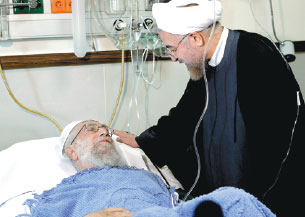Iranian supreme leader undergoes prostate surgery
Iran's supreme leader, Ayatollah Ali Khamenei, has successfully undergone prostate surgery, Iranian state television said on Monday in a rare public report on the state of his health.
Khamenei, 75, told state television ahead of the surgery that "there is no reason to worry. Of course this does not mean that I don't need people's prayers".
State television said later the operation was successful.
"The operation took place without anesthetic at a state hospital. The leader will stay at the hospital for a few days to recover like all other identical cases," said Alireza Marandi, the head of Khamenei's medical team.
In 1989, Khamenei succeeded the original supreme leader, Ayatollah Ruhollah Khomeini, founder of the Islamic Republic of Iran. Khamenei was Iran's president for two successive terms from 1981 to 1989. In 1981, Khamenei survived an assassination attempt that paralyzed his right arm.
Khamenei has constitutional authority or substantial influence over the executive, legislative and judicial branches of government as well as the military and media. Some feel his departure could expose rivalries in the Islamic republic.
"It would deepen the ongoing political infighting between various political camps in Iran. And obviously there is the danger of the Revolutionary Guards, which will want to cement their power by supporting a more-radical candidate to succeed Khamenei," said a Teheran-based analyst who asked not to be named due to sensitivity of the issue.
"Khamenei is the force behind the establishment. Without him, the system will collapse," he said.
Khamenei has repeatedly denounced the West, particularly the United States, over its actions against Iran's disputed nuclear programs and its broader Middle Eastern policy.
But Khamenei has so far supported the talks between Iran and the six world powers on the nuclear program, which Western countries suspect is aimed at seeking the capability to build a nuclear bomb.
Iran denies the allegations, but Western states have imposed economic sanctions on the major oil producer to make it scale back its atomic activities.
Iran and the major powers have failed to meet a self-imposed July deadline for reaching a comprehensive deal because of wide differences over the permissible size of Iran's enrichment program.
They now face a new deadline of Nov 24, with talks between the seven states due to resume in New York later this month.
However, Khamenei has expressed doubts the talks between Iran, China, the US, Germany, France, Britain and Russia will resolve the decadelong dispute.
|
Iranian President Hassan Rouhani (right) visits supreme leader Ayatollah Ali Khamenei at a hospital in Teheran on Monday. Provided the office of the Iranian supreme leader via AP |
(China Daily 09/09/2014 page12)















